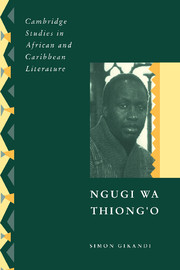Book contents
- Frontmatter
- Contents
- Preface
- Chronology
- 1 Introduction: reading texts and contexts
- 2 Narrative and nationalist desire: early short stories and The River Between
- 3 Educating colonial subjects: the “emergency stories” and Weep Not, Child
- 4 Representing decolonization: A Grain of Wheat
- 5 The poetics of cultural production: the later short stories and Petals of Blood
- 6 Performance and power: the plays
- 7 The prisonhouse of culture: Detained and Devil on the Cross
- 8 The work of art in exile: Matigari
- 9 Writing freedom: essays and criticism
- Conclusion
- Notes
- Bibliography
- Index
7 - The prisonhouse of culture: Detained and Devil on the Cross
Published online by Cambridge University Press: 09 February 2010
- Frontmatter
- Contents
- Preface
- Chronology
- 1 Introduction: reading texts and contexts
- 2 Narrative and nationalist desire: early short stories and The River Between
- 3 Educating colonial subjects: the “emergency stories” and Weep Not, Child
- 4 Representing decolonization: A Grain of Wheat
- 5 The poetics of cultural production: the later short stories and Petals of Blood
- 6 Performance and power: the plays
- 7 The prisonhouse of culture: Detained and Devil on the Cross
- 8 The work of art in exile: Matigari
- 9 Writing freedom: essays and criticism
- Conclusion
- Notes
- Bibliography
- Index
Summary
Sometime in 1977, a few days after Ngugi was promoted to the position of Associate Professor of Literature at the University of Nairobi, the first African to hold a position that had been left unfilled since the departure of the last group of British expatriates in the department, Okot p'Bitek, the Ugandan poet and one of the strongest advocates of popular culture in East Africa, expressed the fear that the novelist had finally become a member of the intellectual establishment. Okot p'Bitek's fear was that now that Ngugi had been accepted by the institutions of education and power in Kenya, he could no longer be interested in incorporating popular and oral culture into his work or the literature curriculum. But these fears were soon proven unfounded, because precisely at the time that he was being invited into the inner sanctuaries of University governance, Ngugi was embarking on the theatrical experiment at Kamĩrĩĩthũ discussed in the previous chapter. And as throngs of workers, peasants, and students boarded buses and trucks to see the performance of I Will Marry When I Want, p'Bitek was impressed enough to declare the experiment at Kamĩĩthũ the most important event on the African literary and cultural scene in the postcolonial period. For the first time, p'Bitek told an Oral Literature Seminar at the University of Nairobi, intellectuals had taken culture to the people and the people were teaching them the terms by which they understood and represented cultural experiences and expressions.
- Type
- Chapter
- Information
- Ngugi wa Thiong'o , pp. 195 - 222Publisher: Cambridge University PressPrint publication year: 2000



